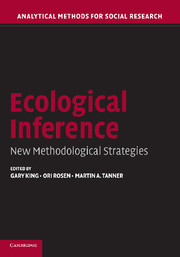Book contents
- Frontmatter
- Contents
- Contributors
- Preface
- INTRODUCTION
- PART ONE
- PART TWO
- PART THREE
- PART FOUR
- 13 Common Framework for Ecological Inference in Epidemiology, Political Science, and Sociology
- 14 Multiparty Split-Ticket Voting Estimation as an Ecological Inference Problem
- 15 A Structured Comparison of the Goodman Regression, the Truncated Normal, and the Binomial–Beta Hierarchical Methods for Ecological Inference
- 16 A Comparison of the Numerical Properties of EI Methods
- Index
15 - A Structured Comparison of the Goodman Regression, the Truncated Normal, and the Binomial–Beta Hierarchical Methods for Ecological Inference
Published online by Cambridge University Press: 18 May 2010
- Frontmatter
- Contents
- Contributors
- Preface
- INTRODUCTION
- PART ONE
- PART TWO
- PART THREE
- PART FOUR
- 13 Common Framework for Ecological Inference in Epidemiology, Political Science, and Sociology
- 14 Multiparty Split-Ticket Voting Estimation as an Ecological Inference Problem
- 15 A Structured Comparison of the Goodman Regression, the Truncated Normal, and the Binomial–Beta Hierarchical Methods for Ecological Inference
- 16 A Comparison of the Numerical Properties of EI Methods
- Index
Summary
ABSTRACT
This chapter presents an extensive and structured Monte Carlo experiment to compare Goodman regression, King's truncated bivariate normal, and the binomial–beta hierarchical methods for ecological inference. Our purpose was to assess the predictive performance of these methods and the degree to which they match standard properties of statistical prediction theory. The experimental design was based on differences between King's and the binomial–beta hierarchical methods, which are major contributions to the recent EI literature. The results obtained indicate that Goodman regression is the weakest method, the BBH method has good predictive ability but is a biased point predictor, and King's method is the best among the three, doing well in predictive performance as well as in statistical properties. In the concluding section, the methodological relevance of using Monte Carlo experiments to evaluate and compare aggregation-consistent EI methods is highlighted.
INTRODUCTION
Although the ecological inference problem has challenged social scientists for more than a century, few solution techniques have been proposed in the literature (e.g., Cleave, 1992; Achen and Shively, 1995; King, 1997).Three of these techniques have received much attention in recent years, particularly in political science studies. One is an old approach based on a linear regression model and popularly known as Goodman regression, due to Goodman (1953, 1959).
Information
- Type
- Chapter
- Information
- Ecological InferenceNew Methodological Strategies, pp. 351 - 382Publisher: Cambridge University PressPrint publication year: 2004
